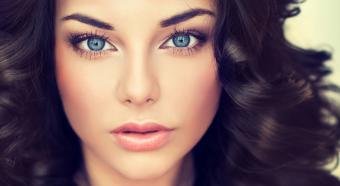
There's nothing that sent me into a pre-teen tantrum faster than shopping for Easter clothes. The reason? Those darling spring pastels made me look like a walking corpse. We've all experienced trying something on and knowing it doesn't look the way you want it to but not knowing why that is. Avoid future disappointment by learning what colors look best on you and how to find them at home.
What Colors Look Good on Me? Find Your Undertone & Season
If you're standing in the middle of a dressing room and trying to figure out which color outfit will look the best, you've come to the right place. Before we break down undertone, color season, and how they intersect with color theory, let's cut right to the chase.
Depending on your undertone and color season, these are colors that look fabulous on you:
| Undertone/Season | Complementary Colors |
|---|---|
| Warm Undertone | red, rust, burnt orange, mustard yellow, citrus yellow, khaki, olive, chocolate brown, peach, coral, and red-violet |
| Cool Undertone | cobalt blue, turquoise, icy blues, mint, grass green, frosty purple, frosty pink, and berry reds |
| Neutral Undertone | true red, muted raspberry, creamsicle, lemon, and lavender |
| Deep/Dark Undertone | gold, light yellow, cream, white, cobalt, pale blue, lavender, light pink, red, orange, peach, emerald, and new green |
| Dark Olive Undertone | tan, cream, brown, gray, gold, maroon, fuchsia, hot pink, carrot, electric blue, and teal |
| Winter | black, deep blue, crimson, dark pink, silver, sky blue, light sunny yellow, and bright white |
| Spring | peach, golden yellow, copper, coral, bright aqua, greens, royal blue, and ivory |
| Autumn | olive, forest green, mossy green, oranges, dark browns, burgundy, purples, camel, and rich beige |
| Summer | dusty pink, rose pink, pale yellow, lavender, pale mauve, powder blue, and soft white |
How to Determine What Colors Look Best on You
While you can wear any color you want, a few techniques are designed to help you find color schemes that complement your undertone and natural features. These techniques use basic color theory to identify which contrasting and complementary colors are best suited to your body's color palette.
Start by Identifying Your Undertone
Undertone refers to the most dominant pigment that shines through your skin. There are three broad categories people usually fit into:
- Warm
- Cool
- Neutral/Olive
There are multiple ways to identify your undertone, but a tried-and-true method is to look at the veins on your wrists. If they appear more green, you likely have warm undertones. If they look more blue/bordering on purple, you probably have cool undertones. And if they land in the middle, you've probably got a neutral or olive undertone.
This old method does work best on lighter skin tones. Another way people with darker skin can identify their undertones is through the silver and gold method. Grab some jewelry or clothing in pure gold and silver. Drape them over your skin and see which one catches your eye the most. Which ends up looking the brightest and having the highest contrast? If it's the silver, you're on the cooler side. And if it's the gold, you're on the warmer side. But if both are equally striking, then you're neutral.
The Best Colors for Your Undertone
The best thing about knowing your undertone is being able to find fashionable colors right away. We've got all the color matches to help you navigate, complementing your undertone with ease.
Warm Undertone Colors
If you have warm undertones, your skin will probably be a creamy white, peachy beige, golden olive, or honey-brown. Additionally, your natural hair color will be creamy or pewter white, golden or strawberry blond, golden or caramel brown, an almost-black shade of brown, copper, or wine red.

These are some of the colors that will look best on you.
- Rich, earthy shades of red
- Rust and burnt oranges
- Mustard and citrus yellows
- Khaki and olive greens
- Chocolate browns
These particular shades will emphasize your golden tones and make you look and feel radiant. Peach, coral, and red-violet are also great shades for your complexion.
While blue isn't an immediate choice for warm-toned complexions, periwinkle and teal are the blues best suited to you. Anything cooler can make your skin have a grayish cast. When it comes to neutrals, stick with warm grays and off-whites.
Cool Undertone Colors
With a cool undertone, your skin is likely a cool white, rosy beige, rosy pink, olive with blue or green undertones, black with blue undertones, or rosy brown. Your natural hair color might be ash-blond, sandy blond, towhead, ash, dark brown, black with blue undertones, auburn, snow white, or silvery gray.

In contrast to warm-toned complexions, your blue undertones are well-suited to sea shades like these.
- Cobalt blue and turquoise
- Icy blues
- Greens (especially mint and grass greens)
- Frosty purples and pinks
- Berry reds
When it comes to neutrals, stick to cool grays and crisp white shades. Steer clear of warm shades like oranges, tomato reds, and yellows, as they can overpower your cool complexion.
Neutral Undertone Colors
With neutral undertones, your skin is probably ivory, beige, light to medium olive, or light brown, and your natural hair color is blond, brown, red, or white/gray. The combination of your skin, hair color, and eye color has both warm and cool tones running through it.

As you have a mixture of both tones, you're lucky enough to be able to wear the full spectrum of colors.
- Your standout, winning color is true red.
- Opt for softened sherbet shades like muted raspberry, creamsicle, lemon, and lavender.
- Rich, bright, or neon colors can topple the balance in your complexion.
Thanks to their warm/cool balance, these colors look great on any undertone: true red, blush pink, teal, and eggplant.
Deep and Darker Undertone Colors
For deep and darker skin tones, you want to accentuate your natural coloring. The color range can stretch from mahogany to deep honey. You can choose from rich, vibrant, and light colors, and lighter colors provide a great contrast to your natural undertones. Your hair color may be dark brown/black, red or auburn, or gray, but you can also pull off a light color, such as blonde or another funky bright color.

These are the colors that you should be rockin' if you have a darker, deep undertone.
- Gold or other metallic colors
- Light yellow
- White or cream
- Cobalt or pale blue
- Purple or lavender
- Red or light pink
- Orange or peach
- Emerald or new green
Any of these colors will complement your deep and/or darker skin tone beautifully. From a brilliant, crisp white to a dreamier soft cream color, lighter colors are the perfect contrast to your skin tone. Don't forget that there are also soft colors like pale blue, summer lavender, light pink, coral/peach, and the bright lightness of new green colors that you can pull from, too.
Dark Olive Undertone Colors
Olive skin tone has green and/or yellow undertones. You can choose colors that complement yellows and greens, but you'll want to go with lighter or darker hues for your best colors. Your ideal hair color may be a deep russet, auburn, jet black, or contrasting light color.

To make your dark olive undertone pop, fill your closet with these colors.
- Tan /cream or brown
- Gray or gold
- Red or maroon
- Fuchsia or hot pink
- Orange or carrot
- Electric blue or teal
Next, Identify Your Color Season
Color seasons have recaptured the internet's interest in the past few years. And while there's some debate as to their accuracy, many people swear by them. There are four main color seasons:
- Spring
- Summer
- Autumn
- Winter
There are also subsets within these seasons, but figuring out your basic color season is a great first step. The best way to test for your season is to try on different colors and shades since most people don't have the quick access to the fabric swatches that color analysts do.
Try on different colors in varying shades, stand in natural lighting, and look into a mirror. Which colors make your skin look the most radiant? Which ones provide the biggest contrast, and, by result, are the most striking? Tally the ones you feel you look the best in; chances are, they fall into one season's color palette.
For example, I'm an autumn, but that doesn't mean I only wear browns and oranges (though I'm a huge fan of those). I can also pop in some bright chartreuse, dark olive, and so much more.
If you're interested in a more detailed analysis, check out the Association of Image Consultants International's (AICI) directory to find a professional image consultant in your local area. Note that you will have to pay for any AICI color analyst's services.
Related: Understanding Seasonal Colors in Fashion Just Got Easier
What Colors Look Best on Me? Choosing by Season
Whether you're a spring, summer, winter, or fall, we're breaking down the best colors for you to wear.
Winter
If you are a winter, your skin color might be pale, olive, or dark; skin undertones are typically blue or rosy pink. Your hair and eye color may contrast your skin. Black, dark, or white blonde hair are typical winter hair colors.

Winters look great in deep, rich colors such as black, deep blue, crimson, and dark pink. Icy pastels like silver, sky blue, light sunny yellow, and pink can also look wonderful. Bright white is another good color for many winters since this stark neutral works well with hair and eye color contrast.
Spring
If you're a spring, your skin undertones may be gold-yellow. Your skin coloring is typically cream or peach, and your hair color ranges from auburn to golden and strawberry blonde. Springs often have freckles and lighter eye colors.

Springs look best in soft, rich colors. Warm colors such as peach, golden yellow, copper, coral, and brown shades with warm tones are good choices. Bright aqua, green, and royal blue can also look stunning. Rather than bright white, springs can opt for rich, creamy ivory as a wardrobe staple.
Autumn
If you're an autumn, your undertones are typically golden, with skin coloring in shades like peach, beige, and golden brown. Red, red-brown, dark blonde, rich brown, or brown-black hair shades are common for this season. Autumns also tend to have darker eye colors.

Autumn looks wonderful in rich neutrals, earth-toned, and spicy colors. Consider olive, forest, or mossy greens, orange shades, grays, dark browns, burgundy, purples, camel, and rich beige.
Summer
If you're a summer, your undertones might be pale blue or pale pink, and your skin might be pale or pink-toned. Light eyes and blonde or light to medium brunette hair are commonly seen in summers.

Summers look excellent in soft shades and muted colors with cool undertones (or light-colored neutrals). Some of the best summer colors include dusty or rose pink, pale yellow, lavender or pale mauve, and powder blue. A soft white can also work for this season.
Treat Your Best Colors as a Guideline
All of this talk about undertones and color seasons doesn't mean that you have to stick to one of your suggested colors. These are guidelines, not rigid rules! However, they can be really helpful in building your forever wardrobe. These colors will enhance your natural complexion and features without clashing with your hair or skin tone and will always work in a pinch.
Of course, if you dramatically change your hair color, your best-suited colors may alter slightly, so it's important to be flexible as you move through life. Who knows what the wonderful world of style has in store for you in the future?

Wearing Colors That Look Great on You Will Help You Shine
When you tune into your body and natural complexion and wear colors that complement your skin tone instead of clashing with it you'll look and feel your best. Finding which colors look good on you is one stepping stone to crafting a style that makes you feel like a million bucks.







